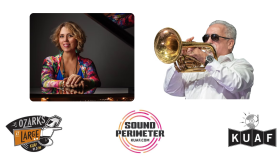Janine Parry said that her final push in her decision to leave came at an unexpected moment. She was traveling with her husband, but the reasons for her early departure came from more than that.
“There was one particular waitress actually at Grand Teton at the Rockefeller Center, which was unreal,” Parry said. “They have this 50s diner set up, there are no tables or booths. Everything is one long counter. The facility was built in the 60s and this classically dressed server comes in. It turns out when we're talking to her, that she was a 57 year old retired paralegal and she was living with her college roommate in the housing that's provided. We just started asking her questions and from that point forward, both my husband and I just got fixated on it. Like, we could totally do this.”
“And we got a plan,” Parry said, “and we got a financial advisor, which was part of the plan. We tried to live pretty small … small-ish … just make this goal a reality, so and we did.
“Also, I have a sister who was diagnosed with a pretty troubling disease [recently], and she's younger than I am. I was like, ‘oh, well, now I have to go home.’”
Outside of the Arkansas Poll, Parry's most recent research has centered around the rise of party monopolies in states.
“40 some of the states right now are in a situation in which their governors and their legislatures are almost always majority control one party,” Parry said. “But as we've talked about in class, not just majority control, but like 80% majority control — super majority. I define it as this: if it's lasted for 10 or more consecutive years, that's a party monopoly. Like Arkansas, if you look over the entirety of the data set, Arkansas has been in a position of party monopoly like 92% of the time. Hawaii, 100% of the time.”
“So what usually happens in those situations is, voter turnout is lower in those states because there's no contest, right? Everybody knows that the Republicans are going to win or in a handful of states that the Democrats are going to win. It appears that corruption is higher. People tend to kind of take liberties and they know they're not going to get in trouble if they get caught with their hand in the cookie jar. That's demonstrably the case and has been throughout the 20th century. People care less about politics, they have less interest in politics because it's just the same old thing happening. It used to be the case in the 50s, when there were a lot of state party monopolies and not just in the South.”
“So now what's happening? This is a little bit interesting, a different twist,” Parry said. “The majority party isn't responsive to the majority of the people, but it's almost like it's hyper responsive. So instead of doing nothing, it does too much. So the consequence of that is extreme kind of policies. So, abortion regulation, gun regulation. In red states, pretty much all abortions are illegal. When majority public opinion, it's well established 75 to 85% of us think that it should be legal in some cases. It’s way out of step. it's what scholars call incongruous: the public opinion and public policy don't match. In fact, they're opposites of each other. And it's the same thing with gun regulation; 80-90% of US support different kinds of regulation. And red states are doing everything they can to do the opposite of that and say, ‘Now we have, open carry.’ And people are like, ‘How did that happen? What?’”
Olive Kuester is a senior at the U of A and took gender in politics with Parry two years ago. Now she works with Parry on the Arkansas Poll, which has been collecting Arkansas's opinions on policy.
“It was the second semester back in person after COVID,” Kuester said. “I hadn't really cared that much as a student, and I honestly hadn't really ever felt cared for as a student up until that point. But, being in her class totally reinspired my love and passion for learning, and also just made me feel wanted and cared for as a student and important probably for the first time in my college career. She makes note cards with your face on them, and has you fill them out at the beginning of the semester and is so diligent to ensure that she knows all of her students names throughout the semester and that really just touched me and made me want to work with Dr. Parry and continue to take her classes.”
“So I then took Arkansas Politics and then Policy and Politics and Film. The second semester of classes with her, I just reached out about an internship opportunity with the Arkansas Poll, and she graciously allowed me to help her, and then I've been working for her as her research assistant for the last almost two years now. I've learned so many invaluable skills from her that I would have never have learned in just normal classes like research skills and how to read data and use [statistical software] and just all kinds of skills that are definitely going to transfer over to my time as a grad student. I’m so endlessly thankful for her.”
Andrew Dowdle is another political science professor. He said he was impressed by Parry and her knowledge from the moment he first met her.
“Even though at that point she was a relatively a new faculty member,” Dowdle said, “I also ended up impressed with her professionalism in terms of the questions that she asked. When I asked her about questions about the university, the amount of knowledge that she ended up having, that was something typically that you would have necessarily have expected somebody to have after being here for four or five years. I would have been more typical of somebody been here 15 years.”
Kuester said Parry was just as beneficial in helping her grow academically as she was on a personal level with the well-being of her students.
“I was an intern the first year in 2023, and then a research assistant in 2024 [for the Arkansas Poll]. I helped her set up the summary report and run the descriptive statistics that would go into the summary report and make some graphs for the findings that the Arkansas Poll returned and a lot of data visualization,” Kuester said.
Many have wondered who will take over the Arkansas poll once Parry leaves the University. Kuester said there have been a few people expressing interest in it.
“I think it's a bit uncertain at this point, Kuester said. “I know the Blair Center will ultimately decide what's going to happen. It's an expensive project and it takes a specific kind of person to be able to do it and do it well. I think the university has been really lucky to have someone like Dr. Parry to run the Arkansas Poll for the last 25 years, and I definitely think there are big shoes to fill. Hopefully they can figure someone out, because it's a really valuable tool for public opinion.”
Parry has done research, impactful instruction and been involved in multiple areas of campus, which leads the university with a noticeable gap in the political science faculty.
“Other senior professors at other campuses in the country made the comment that her record is unparalleled in terms of what you would end up seeing in terms of involvement with students and involvement with all of these other organizations across the state. She's going to be somebody that's really going to be impossible to end up replacing,” Dowdle said.
While Parry will surely be missed, she has greener pastures to tend to.
Ozarks at Large transcripts are created on a rush deadline by reporters. This text may not be in its final form and may be updated or revised in the future. Accuracy and availability may vary. The authoritative record of KUAF programming is the audio record.








